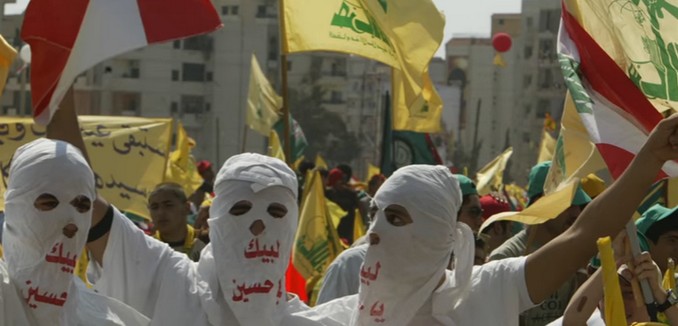Hezbollah’s recent defeat of Sunni jihadist near the Lebanon-Syria border and subsequent prisoner exchange underscores the degree to which Hezbollah and Lebanon are indivisible, the Associated Press reported Sunday.
The partnership received greater attention after President Donald Trump praised the government of Lebanese Prime Minister Saad Hariri for its efforts to fight terrorist groups including Hezbollah, a characterization which received much criticism. “Far from being an ally in the fight against Hezbollah,” the AP reported, “the Lebanese government headed by Saad Hariri is based on a partnership with the Shiite group, whose clout and dominance in the tiny country is on the rise.”
“The Iranian proxy is the single most potent military and political force in Lebanon, with an arsenal surpassing that of the country’s army,” the AP wrote of Hezbollah. “By many accounts, Hezbollah has brought disaster to the country by engaging in destructive wars with Israel, and, as Trump himself noted, it has fueled the humanitarian catastrophe in Syria where it has sent thousands of its fighters to shore up President Bashar Assad’s forces.”
In addition to its military might, Hezbollah operates its own secure telecommunications network, maintains control over vital Lebanese facilities, and holds “veto power in the Lebanese cabinet.”
“We have our opinion and Hezbollah has its opinion, but in the end, we met on a consensus that concerns the Lebanese people for the (good of) the Lebanese economy, security and stability,” Hariri conceded, calling the recent battles led by Hezbollah “a big achievement.”
When reporters for The Washington Post toured the Lebanon-Syria border with Hezbollah after the fighting concluded, they noted that “nowhere was there any evidence of the Lebanese state.”
During that tour, the AP reported, “the group repeatedly stuck the yellow Hezbollah flag next to the Lebanese flag, suggesting the two cannot be separated.”
Israeli officials contend that such displays are further evidence that there is no separation between the Lebanese government and the terrorist group.
This assessment was echoed by Faysal Itani, a senior fellow at the Atlantic Council, who said of Hezbollah, “I do not see them as separate from the Lebanese government.”
Hezbollah warned earlier this year that its rockets could hit any target in Israeli territory. Iran is believed to be building underground weapons factories for the group in Lebanon, one of which reportedly produces Fateh 110 rockets that can carry half-ton warheads and reach most of Israel.
Iran is banned from exporting weapons by the United Nations Security Council, and is specifically forbidden from arming Hezbollah by Security Council resolution 1701.
In July, IDF Chief of Staff Lt. Gen. Gadi Eisenkot told a Knesset committee that Israel was aware of the factories and was “working against it using quiet measures to avoid a deterioration of the situation.”
A month earlier, Eisenkot warned that Hezbollah has a presence in “every third or fourth house” in southern Lebanon. He indicated that the group is ensconced in some 240 villages and towns in the area, and receives sophisticated weaponry from Iran, some of which is supplied by Russia.
Maj. Gen. Amir Eshel, commander of the Israeli Air Force, explained the following day that Hezbollah has established thousands of bases in Beirut, the Bekaa Valley, and southern Lebanon, both “above and below live civilians whom we have nothing against—a kind of human shield.”
“That is where we will have to fight” in the event of a future conflict, he added. “Whoever stays in these bases will simply be hit and will risk their lives. And whoever goes out will live.”
In June, Hezbollah leader Hassan Nasrallah threatened that thousands of Shiite fighters, including from Iran and Iraq, could join forces with Hezbollah in a future war against Israel.
According to a July 2016 report by the Foundation for Defense of Democracies, Israeli officials believe that any future war with Hezbollah has the potential to cause “thousands of civilian deaths” in Israel.
Jonathan Schanzer, senior vice president of the Foundation for Defense of Democracies, explained that month that Hezbollah’s widely-reported tactic of hiding military assets in civilian areas would lead to mass casualties. Reports emerged in 2013 that Hezbollah was offering reduced-price housing to Shiite families who allowed the terrorist group to store rocket launchers in their homes. An Israeli defense official told The New York Times in May 2015 that the buildup of Hezbollah’s terror infrastructure in southern Lebanese villages meant that “civilians are living in a military compound” and that their lives were at risk. A few days later, a newspaper linked to Hezbollah bolstered the Israeli assessment.
Brig. Gen. (res.) Nitzan Nuriel, a former director of Israel’s Counter-Terrorism Bureau, said in March that another war between Israel and Hezbollah was “only a question of time” due to the Iranian proxy’s efforts to acquire “game-changing weapons.” A week later, Eisenkot assessed that Hezbollah is building up its arsenal in Lebanon, which will bear the brunt of any future conflict between the Iranian proxy and Israel. Israeli security officials warned earlier in March that the Lebanese army, which receives American military aid, will likely fight alongside Hezbollah in a war against Israel.
[Photo: Newsy / YouTube ]




